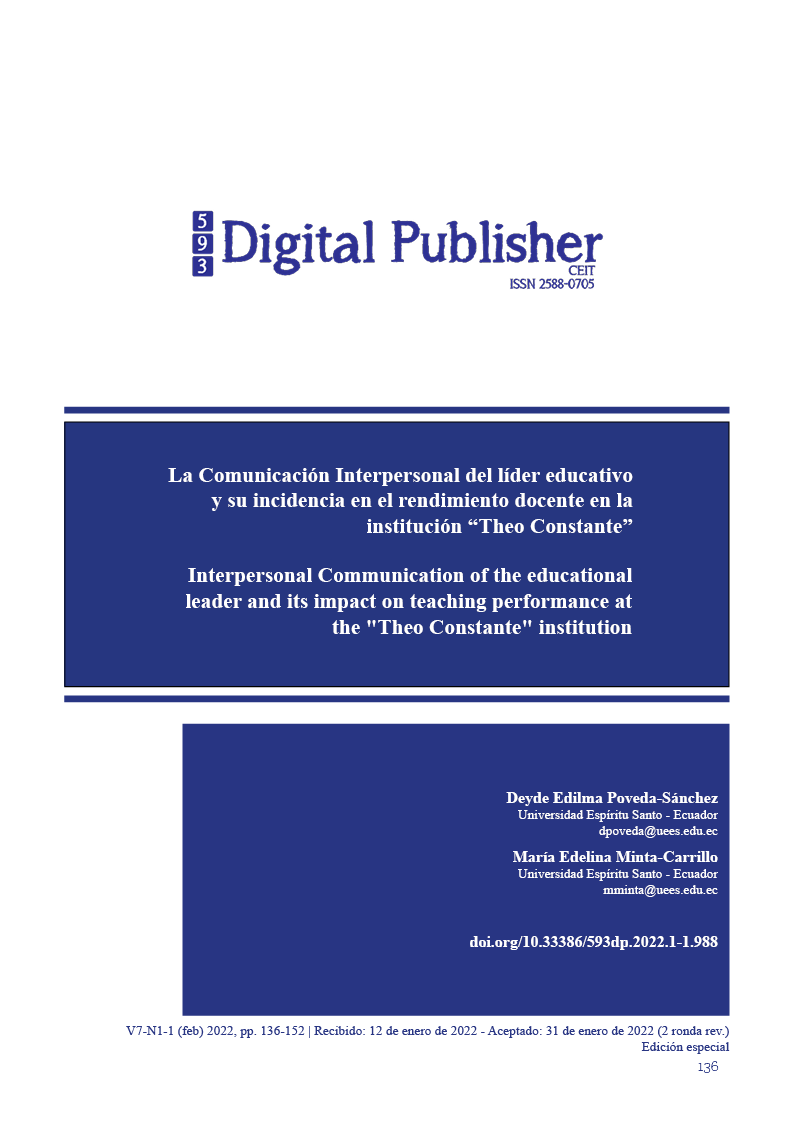La Interpersonal Communication of the educational leader and its impact on teaching performance at the "Theo Constante" institution
Main Article Content
Abstract
The educational administration is considered an important element for the function of the school community, being the most influential part in the results, after the action of the teachers. This entails good leadership, which allows to develop together with the collaborators towards the proposed objective, to establish the interpersonal communication strategies of the educational leader with the purpose of directing to a better teaching performance in the institution "Theo Constante", projecting a motivating vision, guiding, listening, creating interest and security. As an effect, the way they carry out their tasks will be positively influenced, not only what they do, but also how they do it.
For his part, the leader must be an observer, know himself, have control of his emotions, know how to accept mistakes and take constructive criticism into account. Likewise, as a team, the goal should be to work transparently, empathically and also report the results obtained from the work, as this builds trust and motivation. However, all these characteristics of educational administration and leadership are unknown by educational institutions, which leads to a great current problem.
It is for this reason, in the present investigative work we will apply a descriptive, analytical, experimental, logical, inductive, deductive historical investigation with a quantitative and qualitative approach, to know the reality of the institution, the most important characteristics of personal leadership are identified and teachers' interpersonal skills.
The educational administration is considered an important element for the function of the school community, being the most influential part in the results, after the action of the teachers. This entails good leadership, which allows to develop together with the collaborators towards the proposed objective, to establish the interpersonal communication strategies of the educational leader with the purpose of directing to a better teaching performance in the institution "Theo Constante", projecting a motivating vision, guiding, listening, creating interest and security. As an effect, the way they carry out their tasks will be positively influenced, not only what they do, but also how they do it.
For his part, the leader must be an observer, know himself, have control of his emotions, know how to accept mistakes and take constructive criticism into account. Likewise, as a team, the goal should be to work transparently, empathically and also report the results obtained from the work, as this builds trust and motivation. However, all these characteristics of educational administration and leadership are unknown by educational institutions, which leads to a great current problem.
It is for this reason, in the present investigative work we will apply a descriptive, analytical, experimental, logical, inductive, deductive historical investigation with a quantitative and qualitative approach, to know the reality of the institution, the most important characteristics of personal leadership are identified and teachers' interpersonal skills.
The educational administration is considered an important element for the function of the school community, being the most influential part in the results, after the action of the teachers. This entails good leadership, which allows to develop together with the collaborators towards the proposed objective, to establish the interpersonal communication strategies of the educational leader with the purpose of directing to a better teaching performance in the institution "Theo Constante", projecting a motivating vision, guiding, listening, creating interest and security. As an effect, the way they carry out their tasks will be positively influenced, not only what they do, but also how they do it.
For his part, the leader must be an observer, know himself, have control of his emotions, know how to accept mistakes and take constructive criticism into account. Likewise, as a team, the goal should be to work transparently, empathically and also report the results obtained from the work, as this builds trust and motivation. However, all these characteristics of educational administration and leadership are unknown by educational institutions, which leads to a great current problem.
It is for this reason, in the present investigative work we will apply a descriptive, analytical, experimental, logical, inductive, deductive historical investigation with a quantitative and qualitative approach, to know the reality of the institution, the most important characteristics of personal leadership are identified and teachers' interpersonal skills. As an instrument, a survey and interview were used, obtaining the required information, achieving the development of our work in an organized way through the interpretation of data, affirming the veracity of the research, obtaining valid and reliable facts that will favor the work.
Downloads
Article Details

This work is licensed under a Creative Commons Attribution-NonCommercial-ShareAlike 4.0 International License.
1. Derechos de autor
Las obras que se publican en 593 Digital Publisher CEIT están sujetas a los siguientes términos:
1.1. 593 Digital Publisher CEIT, conserva los derechos patrimoniales (copyright) de las obras publicadas, favorece y permite la reutilización de las mismas bajo la licencia Licencia Creative Commons 4.0 de Reconocimiento-NoComercial-CompartirIgual 4.0, por lo cual se pueden copiar, usar, difundir, transmitir y exponer públicamente, siempre que:
1.1.a. Se cite la autoría y fuente original de su publicación (revista, editorial, URL).
1.1.b. No se usen para fines comerciales u onerosos.
1.1.c. Se mencione la existencia y especificaciones de esta licencia de uso.
References
Anchundia Rivadeneira, G. (2015). Repositorio Universidad Andina Simón Bolívar . Obtenido de El clima escolar y su influencia en el proceso enseñanza –aprendizaje: https://repositorio.uasb.edu.ec/bitstream/10644/6352/1/T2698-MGE-Anchundia-El%20clima.pdf
Anchundia, D. I. (2019). Desempeño docente y su influencia en el aprendizaje del estudiante del bachillerato en Manta. Revista científica Dominio de las Ciencias, 17.
Arana, A. L. (2017). Liderazgo directivo y desempeño docente. Obtenido de Dialnet: file:///C:/Users/usuario/Downloads/Dialnet-LiderazgoDirectivoYDesempenoDocenteEnUnaInstitucio-7145924.pdf
Bolaños, J. D. (Agosto de 2015). Universidad Rafael Landívar. Obtenido de Relaciones interpersonales docentes y manejo de conflictod : http://recursosbiblio.url.edu.gt/tesiseortiz/2015/05/09/Bolanos-Jose.pdf
Bravo, & Jurado, G. y. (3 de Junio de 2018). La comunicación interpersonal en el proceso de enseñanza aprendizaje de la carrera Licenciatura en Educación. SciElo, 14(63), 11. Obtenido de http://scielo.sld.cu/scielo.php?script=sci_arttext&pid=S1990-86442018000300075
Cano, O. L. (2018). Repositorio de la Escuela de Posgrado César Vallejo. Obtenido de file:///C:/Users/usuario/Downloads/Cano_OL..pdf
Contreras, S. E. (2020). El concepto de estrategia como fundamento de la planeación estratégica. Pensamiento y gestion - Red de Revistas Científicas de América Latina, el Caribe, España y Portugal, P - 7 - 31.
Coronado, T. J. (2017). Dialnet. Obtenido de Liderazgo directivo y desempeño docente: file:///C:/Users/usuario/Downloads/Dialnet-LiderazgoDirectivoYDesempenoDocenteEnUnaInstitucio-7145924.pdf
Cuno, C. L. (2017). Universidad de posgrado de Perú . Obtenido de Comunicación interpersonal y clima laboral de docentes en instituciones educativas de primaria de la Ugel Yauli : https://repositorio.uncp.edu.pe/bitstream/handle/20.500.12894/4283/Cuno%20Calloapaza.pdf?sequence=1
Figueroa, C. P. (2016). Repositorio de la Universidad Santo Tomás De Colombia. Obtenido de La influencia docente en el desarrollo del pensamiento crítico como una habilidad para la vida en niños, niñas y adolescentes con necesidades educativas especiales.: https://repository.usta.edu.co/bitstream/handle/11634/2503/2016paolafigueroa.pdf?sequence=1
Figueroa, V. F. (Octubre de 2016). Diseño de plan de capacitación para mejorar la productividad de los docentes en la Escuela Blanca Gilbert de Intriago. Obtenido de Repositorio de la Universidad de Guayaquil: http://repositorio.ug.edu.ec/bitstream/redug/40086/1/DISE%C3%91O%20DE%20PLAN%20DE%20CAPACITACI%C3%92N%20PARA%20MEJORAR%20LA%20PRODUCTIVIDAD%20DE%20LOS%20DOCENTES.pdf
García, L. S. (2019). Repositorio de la Universidad Nacional José Faustino Sánchez Carrión Huacho. Obtenido de Desempeño Docente Y El Rendimiento Academico De Los Estudiantes Del Ii Ciclo De La Carrera Profesional De Educación Inicial De La Facultad De Educación De La Universidad Nacional José Faustino Sánchez Carrión Huacho.: http://repositorio.unjfsc.edu.pe/bitstream/handle/UNJFSC/3031/GARCIA%20LOARTE%20Susana%20Ebelith.pdf?sequence=1&isAllowed=y
Gómez, F. S. (2016). La comunicación. SciElo, 20(3), 4.
Jurado, R. M. (2020). Caracterización de la comunicación interpersonal en el proceso enseñanza-aprendizaje. Revista electrónica de investigación educativa, 22, 11. Obtenido de http://www.ems.sld.cu/index.php/ems/article/view/946/498
Lechuga-Cardozo, & Cardoso, R. (2019). Desempeño laboral de los docentes de la Institución Universitaria ITSA. Revista EAN Revista Escuela de Administración de Negocios, (87), 79-101.
Morales, I., Osmany, B., & Amelia, I. (2018). El liderazgo educativo de la Universidad de Guayaquil. SciElo, 9.
Olivera Machado, M. L. (2019). Motivación y desempeño de los docentes de una institucion educativa. Obtenido de Repositorio Universidad César Vallejo: https://repositorio.ucv.edu.pe/bitstream/handle/20.500.12692/38341/olivera_mm.pdf?sequence=1&isAllowed=y
Otzen, & Manterola, T. O. (2017). Técnicas de Muestreo sobre una Población a Estudio. Revista SciElo, 6.
Perea, M., & Sanchez, P. (2018). Relaciones interpersonales en el clima laboral. Revista CES derecho , 21.
Pérez, J. G. (2019). Escuela de posgrado - Universidad César Vallejo. Obtenido de Liderazgo directivo y relaciones interpersonales: https://repositorio.ucv.edu.pe/bitstream/handle/20.500.12692/27042/P%C3%A9rez%20_JG.pdf?sequence=1
Pizzete, M. X. (2019). Liderazgo y gestión de las personas hoy en día. Revista Científica Multidisciplinar Núcleo do Conhecimento, 69.
Ramírez, C. O. (5 de agosto de 2016). Liderazgo del Directivo para Mejorar Relaciones Interpersonales en Personal de Organizaciones Educativas.
Reynosa, N. E. (2020). Estrategias didácticas para investigación científica: relevancia en la formación de investigadores. SciElo, 14.
Rodríguez, R. E. (2017). Micropolítica escolar y el liderazgo directivo en la escuela. Revista de educación, 14.
Rojas, S. F. (Enero de 2018). Repositorio de la Universidad Rafael Landívar. Obtenido de Capacitación y desempeño laboral: http://recursosbiblio.url.edu.gt/tesiseortiz/2018/05/43/Rojas-Francisco.pdf
Salazar, M. N. (2018). Universidad César Vallejo. Obtenido de Gestión directiva y relaciones interpersonales en la escuela de educación: https://repositorio.ucv.edu.pe/bitstream/handle/20.500.12692/38535/Salazar_MNL.pdf.pdf?sequence=1&isAllowed=y
Saltos, C. M. (2018). Incidencia del Desempeño Profesional del Docente de Educación Inicial. Revista Arbitrada Multidisciplinaria de investigación Socio Educativa, 22.
Sánchez, G. H. (2017). La Comunicación Interpersonal y el Proceso Formativo Creativo en la Escuela Primaria Venezolana. Revista Scientific, 20.
Seminario, G., & Rosa, A. (2019). Repositorio de la Universidad Señor de Sipán. Obtenido de La capacitación y su relación con el desempeño laboral del personal administrativo en la calidad del servicio al usuario, en el hospital Blén de Trujillo 2017: https://repositorio.uss.edu.pe/bitstream/handle/20.500.12802/5548/Garc%C3%ADa%20Seminario%2C%20Rosa%20Alejandrina.pdf?sequence=1&isAllowed=y#:~:text=La%20capacitaci%C3%B3n%20es%20una%20herramienta,de%20crecimiento%20al%20recurso%20humano.
Sierra, V. G. (2016). Liderazgo educativo en el siglo XXI. Revista EAN , 18.
Ventura, L. J. (2017). ¿Población o muestra?: Una diferencia necesaria. SciElo, 43(4).
Vera, C. y. (2017). Políticas educativas de fortalecimiento. 33. Obtenido de https://www.scielo.br/j/ensaio/a/dBNywkDN8XYbcPJKPDYXfwd/?lang=es&format=pdf



